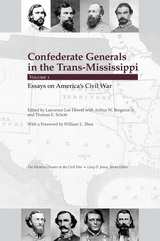
Although the Trans-Mississippi has long been considered a dumping ground for failed generals from other regions, the essays presented here demolish that myth, showing instead that, with a few notable exceptions, Confederate commanders west of the Mississippi were homegrown, not imported, and compared well with their more celebrated peers elsewhere. With its virtually nonexistent infrastructure, wildly unpredictable weather, and few opportunities for scavenging, the Trans-Mississippi proved a challenge for commanders on both sides of the conflict. As the contributors to this volume demonstrate, only the most creative minds could operate successfully in such an unforgiving environment.
While some of these generals have been the subjects of larger studies, others, including Generals Holmes, Parsons, and Churchill, receive their first serious scholarly attention in these pages. Clearly demonstrating the independence of the Trans-Mississippi and the nuances of the military struggle there, while placing both the generals and the theater in the wider scope of the war, these eight essays offer valuable new insight into Confederate military leadership and the ever-vexing questions of how and why the South lost this most defining of American conflicts.
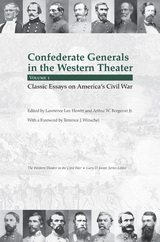
As part of a new series, The Western Theater in the Civil War, this volume reflects the premise that truly understanding the outcome of the war can only be gained through greater knowledge of the western campaigns and the generals who waged them. The essays gathered here—such as Roland’s reassessment of Albert Sidney Johnston, Williams’s examination of P. G. T. Beauregard’s role at Shiloh, Bearss’s look at Bedford Forrest’s great tactical victory at Brice’s Cross Roads, and Vandiver’s analysis of John Bell Hood’s use of logistics—are admirable contributions to this goal. Significantly, in addition to highlighting the Western Theater’s best-known generals, this volume also includes essays on two of its less familiar ones, Patton Anderson and Daniel C. Govan, thus rescuing these fascinating figures from undeserved oblivion.
Future volumes of Confederate Generals in the Western Theater will showcase the latest scholarship with new essays written expressly for the series. By gathering classic earlier work between one set of covers, this opening foray sets a high standard indeed.
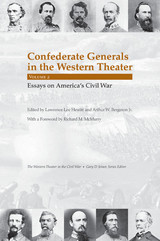
Many students of the Civil War have concluded that the overstudied conflict in the Eastern Theater resulted only in an unwinnable stalemate. For that reason they are now looking to the West for more precise explanations of the Confederates’ failure to win independence. To editors Lawrence Hewitt and Arthur Bergeron, the answers lie with the generals who waged a calamitous war that stretched across nine states and left a long trail of bloody battlefields, surrendered fortresses, burned cities, wrecked infrastructure, and, ultimately, a lost cause.
For this book, which follows an earlier volume of previously published essays, Hewitt and Bergeron have enlisted ten gifted historians—among them James M. Prichard, Terrence J. Winschel, Craig Symonds, and Stephen Davis—to produce original essays, based on the latest scholarship, that examine the careers and missteps of several of the Western Theater’s key Rebel commanders. Among the important topics covered are George B. Crittenden’s declining fortunes in the Confederate ranks, Earl Van Dorn’s limited prewar military experience and its effect on his performance in the Baton Rouge Campaign of 1862, Joseph Johnston’s role in the fall of Vicksburg, and how James Longstreet and Braxton Bragg’s failure to secure Chattanooga paved the way for the Federals’ push into Georgia.
Confederate Generals in the Western Theater will ultimately comprise several volumes that promise a host of provocative new insights into not only the South’s ill-fated campaigns in the West but also the eventual outcome of the larger conflict.
Lawrence Lee Hewitt is professor of history emeritus at Southeastern Louisiana University. A recipient of SLU’s President’s Award for Excellence in Research and the Charles L. Dufour Award for outstanding achievements in preserving the heritage of the American Civil War, he is a former managing editor of North & South. His publications include Port Hudson: Confederate Bastion on the Mississippi.
Arthur W. Bergeron Jr. is a reference historian with the United States Army Military History Institute and a past president of the Louisiana Historical Association. Among his earlier books are Confederate Mobile and A Thrilling Narrative: The Memoir of a Southern Unionist.
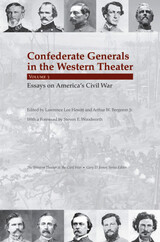
@font-face { font-family: "Times New Roman";}p.MsoNormal, li.MsoNormal, div.MsoNormal { margin: 0in 0in 0.0001pt; line-height: 200%; font-size: 12pt; font-family: Times; }table.MsoNormalTable { font-size: 10pt; font-family: "Times New Roman"; }div.Section1 { page: Section1; }
The American Civil War was won and lost on its western battlefields, but accounts of triumphant Union generals such as Grant and Sherman leave half of the story untold. In the third volume of Confederate Generals in the Western Theater, editors Lawrence Hewitt and Arthur Bergeron bring together ten more never-before-published essays filled with new, penetrating insights into the key question of why the Rebel high command in the West could not match the performance of Robert E. Lee in the East.
Showcasing the work of such gifted historians as Wiley Sword, Timothy B. Smith, Rory T. Cornish, and M. Jane Johansson, this book is a compelling addition to an ongoing, collective portrait of generals who occasionally displayed brilliance but were more often handicapped by both geography and their own shortcomings. While the vast, varied terrain of the Western Theater slowed communications and troop transfers and led to the creation of too many military departments that hampered cooperation among commands, even more damaging were the personal qualities of many of the generals. All too frequently, incompetence, egotism, and insubordination were the rule rather than the exception. Some of these men were undone by alcoholism and womanizing, others by politics and nepotism. A few outlived their usefulness; others were killed before they could demonstrate their potential. Together, they destroyed what chance the Confederacy had of winning its independence.
Whether adding fresh fuel to the debate over the respective roles of Albert Sidney Johnston and P. G. T. Beauregard at Shiloh or bringing to light such lesser known figures as Joseph Finegan and Hiram Bronson Granbury, this volume, like the ones preceding it, is an exemplary contribution to Civil War scholarship.
Lawrence Lee Hewitt is professor of history emeritus at Southeastern Louisiana University. A recipient of SLU’s President’s Award for Excellence in Research and the Charles L. Dufour Award for “outstanding achievements in preserving the heritage of the American Civil War,” he is a former managing editor of North & South. His publications include Port Hudson: Confederate Bastion on the Mississippi.
The late Arthur W. Bergeron Jr. was a reference historian with the United States Army Military History Institute and a past president of the Louisiana Historical Association. Among his earlier books were Confederate Mobile and A Thrilling Narrative: The Memoir of a Southern Unionist.
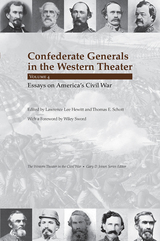
Like its predecessors, the fourth and final volume of Confederate Generals in the Western Theater makes a generous contribution to the historiography of a poorly understood theater of war, presenting new interpretations of major figures while bringing to light both the triumphs and failures of lesser-known generals. Its cutting-edge scholarship offers further grounding for the editors’ contention that the South’s bid for independence was lost on its western battlefields and that the responsibility for those defeats lay more with the Confederate generals than with their opponents.
Among the ten chapters, this collection includes C. David Dalton on the death of Felix Zollicoffer at the Battle of Mill Springs in Kentucky; Roger Durham on Robert E. Lee’s leadership early in the war of the Department of South Carolina, Georgia, and East Florida; Brian S. Wills on Abraham Buford’s behind-the-scenes contributions to Nathan Bedford Forrest’s famous exploits; the late Nathaniel Cheairs Hughes Jr. on the achievements and failings of Gideon J. Pillow; James M. Prichard on John Hunt Morgan and his “last Kentucky raid”; and Keith S. Bohannon on Edward C. Walthall, a Virginia lawyer who overcame his lack of prior military experience to become one of the ablest generals in any of the war’s theaters. Some essays offer full biographies of their subjects; others focus on a single campaign. Along with the previous volumes, this exemplary collection encourages an important rethinking of the course of the Civil War and its ultimate outcome.

Scrupulously edited by Charles Maland, this volume stands as the definitive collection of Agee’s film writing. Not only does it include all of his bylined Nation reviews (December 1942–September 1948), but it also brings together for the first time the entirety of his unsigned reviews and cover stories for Time (September 1942–November 1948), as identified by the magazine’s archivist, Bill Hooper. Also included are various essays Agee produced for other publications—ranging from a prep school appreciation of F. W. Murnau’s The Last Laugh to his celebrated Life magazine pieces on director John Huston and the great comedians of the silent era—as well as several previously unpublished manuscripts found in the Agee collections at the Universities of Tennessee and Texas, which offer additional insight into Agee’s thoughts on movies and on film reviewing.
A constant moviegoer since childhood, Agee wrote about film with wit, keen perception, and high standards, always quick to express disappointment when a movie failed, in his eyes, to live up to what it might have been. But when a movie truly worked for him—William Wellman’s The Story of G. I. Joe, Charles Chaplin’s Monsieur Verdoux, and Huston’s The Treasure of the Sierra Madre are key examples—Agee could be both generous with praise and brimming with insight about the precise features he found so laudable.
Including an extensive introduction that details Agee’s years as a film reviewer, significant characteristics of his style and aesthetic, and his broad influence on later critics, this volume will encourage a fresh understanding of both a remarkable writer and the medium he loved so much.
READERS
Browse our collection.
PUBLISHERS
See BiblioVault's publisher services.
STUDENT SERVICES
Files for college accessibility offices.
UChicago Accessibility Resources
home | accessibility | search | about | contact us
BiblioVault ® 2001 - 2024
The University of Chicago Press









